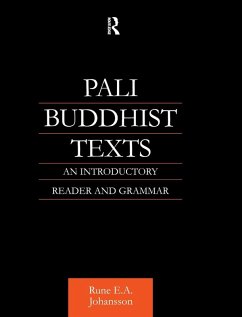- Gebundenes Buch
- Merkliste
- Auf die Merkliste
- Bewerten Bewerten
- Teilen
- Produkt teilen
- Produkterinnerung
- Produkterinnerung
Pali is one of the Middle Indian idioms and the classical language of Theravada Buddhism - and thus important both to linguists and scholars of Buddhism. The original texts collected here are selected for their important and beautiful formulation of Buddhist ideas.
Andere Kunden interessierten sich auch für
![Buddhist Mahayana Texts Buddhist Mahayana Texts]() E. B. CowellBuddhist Mahayana Texts292,99 €
E. B. CowellBuddhist Mahayana Texts292,99 €![Revival: Sakya or Buddhist Origins (1931) Revival: Sakya or Buddhist Origins (1931)]() Rhys Davids CarolineRevival: Sakya or Buddhist Origins (1931)381,99 €
Rhys Davids CarolineRevival: Sakya or Buddhist Origins (1931)381,99 €![Miraculous Stories from the Japanese Buddhist Tradition Miraculous Stories from the Japanese Buddhist Tradition]() Kyoko Motomuchi NakamuraMiraculous Stories from the Japanese Buddhist Tradition271,99 €
Kyoko Motomuchi NakamuraMiraculous Stories from the Japanese Buddhist Tradition271,99 €![A Popular Dictionary of Shinto A Popular Dictionary of Shinto]() Brian BockingA Popular Dictionary of Shinto197,99 €
Brian BockingA Popular Dictionary of Shinto197,99 €![China's Authoritarian Path to Development China's Authoritarian Path to Development]() Liang TangChina's Authoritarian Path to Development198,99 €
Liang TangChina's Authoritarian Path to Development198,99 €![Islam in a Changing World Islam in a Changing World]() Anders JerichowIslam in a Changing World126,99 €
Anders JerichowIslam in a Changing World126,99 €![Chinese Higher Education Reform and Social Justice Chinese Higher Education Reform and Social Justice]() Chinese Higher Education Reform and Social Justice143,99 €
Chinese Higher Education Reform and Social Justice143,99 €-
-
-
Pali is one of the Middle Indian idioms and the classical language of Theravada Buddhism - and thus important both to linguists and scholars of Buddhism. The original texts collected here are selected for their important and beautiful formulation of Buddhist ideas.
Hinweis: Dieser Artikel kann nur an eine deutsche Lieferadresse ausgeliefert werden.
Hinweis: Dieser Artikel kann nur an eine deutsche Lieferadresse ausgeliefert werden.
Produktdetails
- Produktdetails
- Verlag: Taylor & Francis
- Seitenzahl: 312
- Erscheinungstermin: 31. März 2016
- Englisch
- Abmessung: 254mm x 203mm x 11mm
- Gewicht: 567g
- ISBN-13: 9781138143104
- ISBN-10: 1138143103
- Artikelnr.: 45160405
- Herstellerkennzeichnung
- Libri GmbH
- Europaallee 1
- 36244 Bad Hersfeld
- gpsr@libri.de
- Verlag: Taylor & Francis
- Seitenzahl: 312
- Erscheinungstermin: 31. März 2016
- Englisch
- Abmessung: 254mm x 203mm x 11mm
- Gewicht: 567g
- ISBN-13: 9781138143104
- ISBN-10: 1138143103
- Artikelnr.: 45160405
- Herstellerkennzeichnung
- Libri GmbH
- Europaallee 1
- 36244 Bad Hersfeld
- gpsr@libri.de
Rune E.A. Johansson
Chapter 1 Experience is the only Criterion (Majjhima Nikaya I 265)
Chapter 2 Definition of Suffering (Digha Nikaya II 305)
Chapter 3 The Cause of Suffering (Digha Nikaya II 308)
Chapter 4 The Cessation of Suffering (Digha Nikaya II 310)
Chapter 5 The way to Freedom from Suffering (Digha Nikaya II 311)
Chapter 6 The Impermanence of Life (Samyutta Nikaya I 109)
Chapter 7 There is no Soul (Buddhaghosa, Visuddhimagga XVI 90)
Chapter 8 Definition of Personality (Samyutta Nikaya 1135)
Chapter 9 The Factors of Personality (Majjhima Nikaya I 435)
Chapter 10 Feeling (Majjhima Nikaya I 302 f)
Chapter 11 Perception and Ideation
Chapter 12 Three Types of Activity (Majjhima Nikaya I 301)
Chapter 13 Volition and the Activities (Samyutta Nikaya III 60)
Chapter 14 The Origin of Conscious Processes (Majjhima Nikaya I 259)
Chapter 15 Conciousness and Rebirth (Anguttara Nikaya I 223
Chapter 16 Consciousness may be Calmed (Sutta Nipata, verses 734, 735)
Chapter 17 The Psychological Law of Causality and Its Use
Chapter 18 Liberation is a Natural Process (Anguttara Nikaya V 2 f)
Chapter 19 The Origin and Control of Suffering (Samyutta Nikaya IV 86)
Chapter 20 Everything is Caused (Samyutta Nikaya I 134)
Chapter 21 Man Forms his Own Destiny (Dhammapada, verse 80)
Chapter 22 Karma Sometimes Works Slowly (Dhammapada, verse 71)
Chapter 23 How Rebirth is Influenced by Actions (Anguttara Nikaya I 122)
Chapter 24 A Strong Wish May Influence Rebirth (Majjhima Nikaya III 99 f)
Chapter 25 A Summary of the Way (Dhammapada, verse 183)
Chapter 26 Monk or Not? (Majjhima Nikaya III 33)
Chapter 27 The First Part of the Way: Right View (Digha Nikaya II 311 f)
Chapter 28 Right Purpose (Digha Nikaya II 312)
Chapter 29 Right Speech (Digha Nikaya II 312)
Chapter 30 A More Detailed Definition of Right Speech (Anguttara Nikaya V 205)
Chapter 31 Right Action (Digha Nikaya II 312)
Chapter 32 How the Perfect Ones Live (Anguttara Nikaya I 211 f)
Chapter 33 Right Livelihood (Digha Nikaya II 312)
Chapter 34 Wrong Livelihood (Majjhima Nikaya III 75)
Chapter 35 Right Effort (Digha Nikaya II 312)
Chapter 36 Right Mindfulness (Digha Nikaya II 292)
Chapter 37 Irradiation of Friendliness, Compassion, Tenderness, and Equanimity (Digha Nikaya III 223 f)
Chapter 38 The First of the Nine Levels of Concentration (Digha Nikaya I 182)
Chapter 39 The Second Level Of Concentration (Digha Nikaya I 182)
Chapter 40 The Third Level of Concentration (Digha Nikaya I 183)
Chapter 41 The Fourth Level of Concentration (Digha Nikaya I 183)
Chapter 42 The Fifth, Sixth and Seventh Levels of Concentration (Digha Nikaya I 183)
Chapter 43 The Eighth and Ninth Levels of Concentration (Anguttara Nikaya IV 448)
Chapter 44 The State of Emptiness (Majjhima Nikaya III 293 f)
Chapter 45 How to Meet Persecution and Death (Majjhima Nikaya I 186)
Chapter 46 A Nun Tells her Story (Therigatha, verses 78-81)
Chapter 47 The Buddha Relates how he Attained Nirvana (Majjhima Nikaya I 167)
Chapter 48 Nirvana (Theragatha, verse 79)
Chapter 49 Happiness (Theragatha, verse 227)
Chapter 50 Nirvana is within Reach (Therigatha, Verses 511?EUR"513)
Chapter 51 The Unborn (Udana, p 80)
Chapter 52 Nirvana and Death (Sutta Nipata, verses 1074, 1076)
Chapter 2 Definition of Suffering (Digha Nikaya II 305)
Chapter 3 The Cause of Suffering (Digha Nikaya II 308)
Chapter 4 The Cessation of Suffering (Digha Nikaya II 310)
Chapter 5 The way to Freedom from Suffering (Digha Nikaya II 311)
Chapter 6 The Impermanence of Life (Samyutta Nikaya I 109)
Chapter 7 There is no Soul (Buddhaghosa, Visuddhimagga XVI 90)
Chapter 8 Definition of Personality (Samyutta Nikaya 1135)
Chapter 9 The Factors of Personality (Majjhima Nikaya I 435)
Chapter 10 Feeling (Majjhima Nikaya I 302 f)
Chapter 11 Perception and Ideation
Chapter 12 Three Types of Activity (Majjhima Nikaya I 301)
Chapter 13 Volition and the Activities (Samyutta Nikaya III 60)
Chapter 14 The Origin of Conscious Processes (Majjhima Nikaya I 259)
Chapter 15 Conciousness and Rebirth (Anguttara Nikaya I 223
Chapter 16 Consciousness may be Calmed (Sutta Nipata, verses 734, 735)
Chapter 17 The Psychological Law of Causality and Its Use
Chapter 18 Liberation is a Natural Process (Anguttara Nikaya V 2 f)
Chapter 19 The Origin and Control of Suffering (Samyutta Nikaya IV 86)
Chapter 20 Everything is Caused (Samyutta Nikaya I 134)
Chapter 21 Man Forms his Own Destiny (Dhammapada, verse 80)
Chapter 22 Karma Sometimes Works Slowly (Dhammapada, verse 71)
Chapter 23 How Rebirth is Influenced by Actions (Anguttara Nikaya I 122)
Chapter 24 A Strong Wish May Influence Rebirth (Majjhima Nikaya III 99 f)
Chapter 25 A Summary of the Way (Dhammapada, verse 183)
Chapter 26 Monk or Not? (Majjhima Nikaya III 33)
Chapter 27 The First Part of the Way: Right View (Digha Nikaya II 311 f)
Chapter 28 Right Purpose (Digha Nikaya II 312)
Chapter 29 Right Speech (Digha Nikaya II 312)
Chapter 30 A More Detailed Definition of Right Speech (Anguttara Nikaya V 205)
Chapter 31 Right Action (Digha Nikaya II 312)
Chapter 32 How the Perfect Ones Live (Anguttara Nikaya I 211 f)
Chapter 33 Right Livelihood (Digha Nikaya II 312)
Chapter 34 Wrong Livelihood (Majjhima Nikaya III 75)
Chapter 35 Right Effort (Digha Nikaya II 312)
Chapter 36 Right Mindfulness (Digha Nikaya II 292)
Chapter 37 Irradiation of Friendliness, Compassion, Tenderness, and Equanimity (Digha Nikaya III 223 f)
Chapter 38 The First of the Nine Levels of Concentration (Digha Nikaya I 182)
Chapter 39 The Second Level Of Concentration (Digha Nikaya I 182)
Chapter 40 The Third Level of Concentration (Digha Nikaya I 183)
Chapter 41 The Fourth Level of Concentration (Digha Nikaya I 183)
Chapter 42 The Fifth, Sixth and Seventh Levels of Concentration (Digha Nikaya I 183)
Chapter 43 The Eighth and Ninth Levels of Concentration (Anguttara Nikaya IV 448)
Chapter 44 The State of Emptiness (Majjhima Nikaya III 293 f)
Chapter 45 How to Meet Persecution and Death (Majjhima Nikaya I 186)
Chapter 46 A Nun Tells her Story (Therigatha, verses 78-81)
Chapter 47 The Buddha Relates how he Attained Nirvana (Majjhima Nikaya I 167)
Chapter 48 Nirvana (Theragatha, verse 79)
Chapter 49 Happiness (Theragatha, verse 227)
Chapter 50 Nirvana is within Reach (Therigatha, Verses 511?EUR"513)
Chapter 51 The Unborn (Udana, p 80)
Chapter 52 Nirvana and Death (Sutta Nipata, verses 1074, 1076)
Chapter 1 Experience is the only Criterion (Majjhima Nikaya I 265)
Chapter 2 Definition of Suffering (Digha Nikaya II 305)
Chapter 3 The Cause of Suffering (Digha Nikaya II 308)
Chapter 4 The Cessation of Suffering (Digha Nikaya II 310)
Chapter 5 The way to Freedom from Suffering (Digha Nikaya II 311)
Chapter 6 The Impermanence of Life (Samyutta Nikaya I 109)
Chapter 7 There is no Soul (Buddhaghosa, Visuddhimagga XVI 90)
Chapter 8 Definition of Personality (Samyutta Nikaya 1135)
Chapter 9 The Factors of Personality (Majjhima Nikaya I 435)
Chapter 10 Feeling (Majjhima Nikaya I 302 f)
Chapter 11 Perception and Ideation
Chapter 12 Three Types of Activity (Majjhima Nikaya I 301)
Chapter 13 Volition and the Activities (Samyutta Nikaya III 60)
Chapter 14 The Origin of Conscious Processes (Majjhima Nikaya I 259)
Chapter 15 Conciousness and Rebirth (Anguttara Nikaya I 223
Chapter 16 Consciousness may be Calmed (Sutta Nipata, verses 734, 735)
Chapter 17 The Psychological Law of Causality and Its Use
Chapter 18 Liberation is a Natural Process (Anguttara Nikaya V 2 f)
Chapter 19 The Origin and Control of Suffering (Samyutta Nikaya IV 86)
Chapter 20 Everything is Caused (Samyutta Nikaya I 134)
Chapter 21 Man Forms his Own Destiny (Dhammapada, verse 80)
Chapter 22 Karma Sometimes Works Slowly (Dhammapada, verse 71)
Chapter 23 How Rebirth is Influenced by Actions (Anguttara Nikaya I 122)
Chapter 24 A Strong Wish May Influence Rebirth (Majjhima Nikaya III 99 f)
Chapter 25 A Summary of the Way (Dhammapada, verse 183)
Chapter 26 Monk or Not? (Majjhima Nikaya III 33)
Chapter 27 The First Part of the Way: Right View (Digha Nikaya II 311 f)
Chapter 28 Right Purpose (Digha Nikaya II 312)
Chapter 29 Right Speech (Digha Nikaya II 312)
Chapter 30 A More Detailed Definition of Right Speech (Anguttara Nikaya V 205)
Chapter 31 Right Action (Digha Nikaya II 312)
Chapter 32 How the Perfect Ones Live (Anguttara Nikaya I 211 f)
Chapter 33 Right Livelihood (Digha Nikaya II 312)
Chapter 34 Wrong Livelihood (Majjhima Nikaya III 75)
Chapter 35 Right Effort (Digha Nikaya II 312)
Chapter 36 Right Mindfulness (Digha Nikaya II 292)
Chapter 37 Irradiation of Friendliness, Compassion, Tenderness, and Equanimity (Digha Nikaya III 223 f)
Chapter 38 The First of the Nine Levels of Concentration (Digha Nikaya I 182)
Chapter 39 The Second Level Of Concentration (Digha Nikaya I 182)
Chapter 40 The Third Level of Concentration (Digha Nikaya I 183)
Chapter 41 The Fourth Level of Concentration (Digha Nikaya I 183)
Chapter 42 The Fifth, Sixth and Seventh Levels of Concentration (Digha Nikaya I 183)
Chapter 43 The Eighth and Ninth Levels of Concentration (Anguttara Nikaya IV 448)
Chapter 44 The State of Emptiness (Majjhima Nikaya III 293 f)
Chapter 45 How to Meet Persecution and Death (Majjhima Nikaya I 186)
Chapter 46 A Nun Tells her Story (Therigatha, verses 78-81)
Chapter 47 The Buddha Relates how he Attained Nirvana (Majjhima Nikaya I 167)
Chapter 48 Nirvana (Theragatha, verse 79)
Chapter 49 Happiness (Theragatha, verse 227)
Chapter 50 Nirvana is within Reach (Therigatha, Verses 511?EUR"513)
Chapter 51 The Unborn (Udana, p 80)
Chapter 52 Nirvana and Death (Sutta Nipata, verses 1074, 1076)
Chapter 2 Definition of Suffering (Digha Nikaya II 305)
Chapter 3 The Cause of Suffering (Digha Nikaya II 308)
Chapter 4 The Cessation of Suffering (Digha Nikaya II 310)
Chapter 5 The way to Freedom from Suffering (Digha Nikaya II 311)
Chapter 6 The Impermanence of Life (Samyutta Nikaya I 109)
Chapter 7 There is no Soul (Buddhaghosa, Visuddhimagga XVI 90)
Chapter 8 Definition of Personality (Samyutta Nikaya 1135)
Chapter 9 The Factors of Personality (Majjhima Nikaya I 435)
Chapter 10 Feeling (Majjhima Nikaya I 302 f)
Chapter 11 Perception and Ideation
Chapter 12 Three Types of Activity (Majjhima Nikaya I 301)
Chapter 13 Volition and the Activities (Samyutta Nikaya III 60)
Chapter 14 The Origin of Conscious Processes (Majjhima Nikaya I 259)
Chapter 15 Conciousness and Rebirth (Anguttara Nikaya I 223
Chapter 16 Consciousness may be Calmed (Sutta Nipata, verses 734, 735)
Chapter 17 The Psychological Law of Causality and Its Use
Chapter 18 Liberation is a Natural Process (Anguttara Nikaya V 2 f)
Chapter 19 The Origin and Control of Suffering (Samyutta Nikaya IV 86)
Chapter 20 Everything is Caused (Samyutta Nikaya I 134)
Chapter 21 Man Forms his Own Destiny (Dhammapada, verse 80)
Chapter 22 Karma Sometimes Works Slowly (Dhammapada, verse 71)
Chapter 23 How Rebirth is Influenced by Actions (Anguttara Nikaya I 122)
Chapter 24 A Strong Wish May Influence Rebirth (Majjhima Nikaya III 99 f)
Chapter 25 A Summary of the Way (Dhammapada, verse 183)
Chapter 26 Monk or Not? (Majjhima Nikaya III 33)
Chapter 27 The First Part of the Way: Right View (Digha Nikaya II 311 f)
Chapter 28 Right Purpose (Digha Nikaya II 312)
Chapter 29 Right Speech (Digha Nikaya II 312)
Chapter 30 A More Detailed Definition of Right Speech (Anguttara Nikaya V 205)
Chapter 31 Right Action (Digha Nikaya II 312)
Chapter 32 How the Perfect Ones Live (Anguttara Nikaya I 211 f)
Chapter 33 Right Livelihood (Digha Nikaya II 312)
Chapter 34 Wrong Livelihood (Majjhima Nikaya III 75)
Chapter 35 Right Effort (Digha Nikaya II 312)
Chapter 36 Right Mindfulness (Digha Nikaya II 292)
Chapter 37 Irradiation of Friendliness, Compassion, Tenderness, and Equanimity (Digha Nikaya III 223 f)
Chapter 38 The First of the Nine Levels of Concentration (Digha Nikaya I 182)
Chapter 39 The Second Level Of Concentration (Digha Nikaya I 182)
Chapter 40 The Third Level of Concentration (Digha Nikaya I 183)
Chapter 41 The Fourth Level of Concentration (Digha Nikaya I 183)
Chapter 42 The Fifth, Sixth and Seventh Levels of Concentration (Digha Nikaya I 183)
Chapter 43 The Eighth and Ninth Levels of Concentration (Anguttara Nikaya IV 448)
Chapter 44 The State of Emptiness (Majjhima Nikaya III 293 f)
Chapter 45 How to Meet Persecution and Death (Majjhima Nikaya I 186)
Chapter 46 A Nun Tells her Story (Therigatha, verses 78-81)
Chapter 47 The Buddha Relates how he Attained Nirvana (Majjhima Nikaya I 167)
Chapter 48 Nirvana (Theragatha, verse 79)
Chapter 49 Happiness (Theragatha, verse 227)
Chapter 50 Nirvana is within Reach (Therigatha, Verses 511?EUR"513)
Chapter 51 The Unborn (Udana, p 80)
Chapter 52 Nirvana and Death (Sutta Nipata, verses 1074, 1076)








